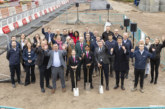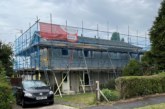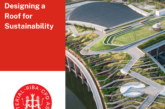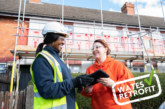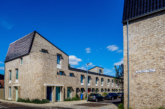Built Environment – Smarter Transformation (BE-ST) has announced a new partnership with the UK Green Building Council (UKGBC Scotland), with a shared ambition to radically improve the sustainability of the built environment.
With a particular focus on the challenges and opportunities in non-domestic retrofit, the organisations will be working together to develop specific evidence and guidance that will showcase best practice and encourage widespread adoption of low carbon retrofit techniques.
There are currently 230,000 non-domestic buildings in Scotland, representing 80% of those that will be in use in 2050 — after the 2045 target to achieve net zero. As a result, all of these schools, offices, factories, hospitals, universities and other types of public buildings will need to be retrofitted and decarbonised over the next two decades.
In addition to the focus on retrofit, BE-ST and UKGBC Scotland will be working together to drive action on embodied carbon policy and regulation, and the financing of green heat, as well as addressing low carbon skills gaps. Recent estimates from the Construction Industry Training Board suggest that more than 250,000 roles will need to be filled by 2026 to keep up with industry demand, with skills to improve energy efficiency highlighted as one of the main pressure points.
BE-ST and UKGBC are also exploring opportunities to collaborate beyond Scotland, capitalising on UKGBC’s national reach and international network, and reflecting BE-ST’s ongoing ambition to build on its UK and international presence.
Jennifer Smart, Head of Sustainability Programmes at BE-ST, said: “As time runs out to achieve zero carbon by 2045, collaboration is a critical part of the toolbox that we can use to drive positive change. We are already working towards the same mission, but by formally partnering with UKGBC we can collectively tap into global expertise, shared facilities and networks to accelerate transformation across the built environment.
“As part of the partnership work, we’ll be developing an evidence base that supports organisations to implement change, including regional challenges and opportunities that impact different parts of Scotland as well as across the UK built environment.”
The UK Green Building Council launched its new Scottish network last year during COP26, responding to the unique physical challenges and political ambition for change in Scotland, and drawing on a UK-wide industry-led network of close to 700 members representing all areas of the built environment. The network aims to promote green building practices and advocates for change by calling for ambitious commitments, stronger standards, and progressive policy.
Simon McWhirter, Director of Communications, Policy and Places at UKGBC, said: “We launched UKGBC Scotland to translate our mission to radically improve the sustainability of the built environment to the specific political, market, socio-economic, and physical built assets in Scotland, and accelerate the transition to a net zero carbon built environment here.
“We are here to support and represent the progressive voices spanning the entire built environment value chain. Collaborating with BE-ST will enable us to collectively make a greater impact on the transformation of the built environment here, by sharing our networks and knowledge to drive change across industry and advocate for policy that puts us on track to securing a net zero built environment by 2045.”
Header image: Stephen Good, CEO at BE-ST and Simon McWhirter, Director of Communications, Policy & Places at UKGBC


